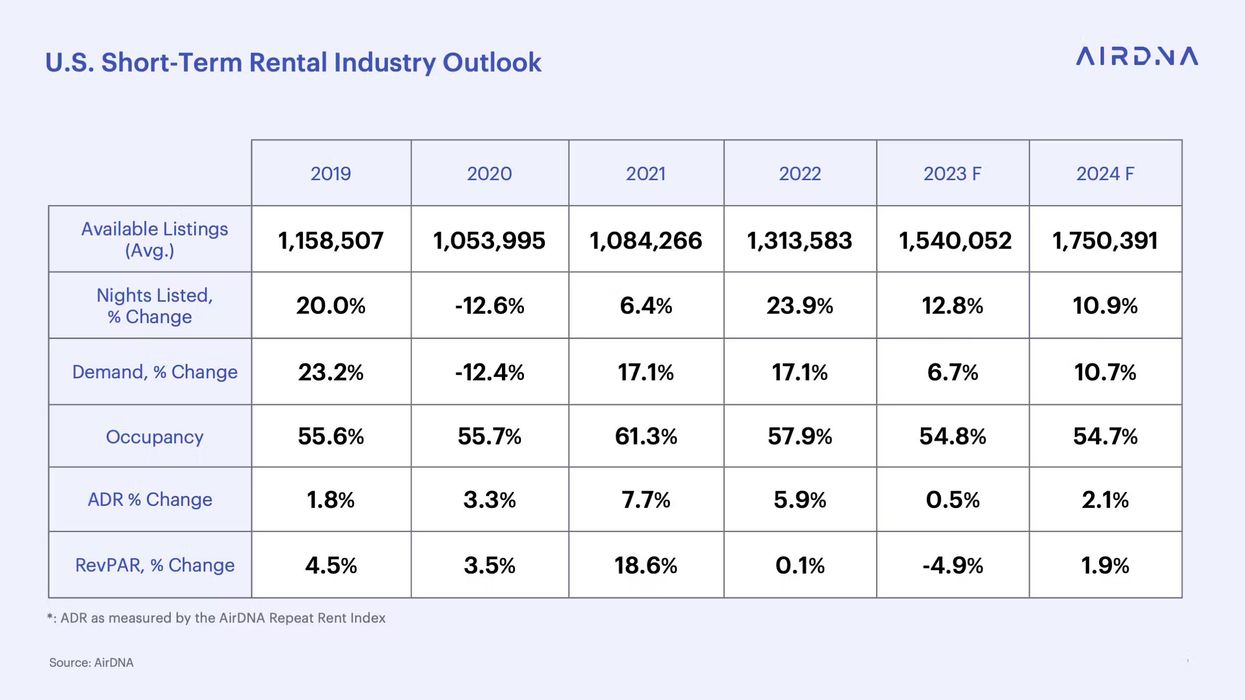A STABLE ECONOMIC backdrop is expected to fuel a 10.7 percent year-over-year increase in the U.S. short-term rental industry in 2024, surpassing the 6.7 percent rise seen in 2023, according to AirDNA’s 2024 outlook report. Moreover, AirDNA foresees balanced growth for the industry in 2024, marked by a projected 10.9 percent increase in supply expansion guided by rising demand for more sustainable market practices.
"Approaching 2024, the industry anticipates balanced growth with a projected 10.9 percent increase in supply expansion," said Jamie Lane, senior vice president of Analytics at AirDNA. "Contrary to exaggerated reports of an STR 'collapse,' heightened market competition emphasizes the need for hosts and property managers to meticulously monitor data trends. This strategic approach is crucial for surpassing competitors and sustaining revenue, taking advantage of a strong economy and the growing preference of travelers for STR lodging.”
A year of mixed signals
Despite reaching a peak of 1.6 million listings in September and a record-breaking July with 24.1 million nights booked, the industry experienced its initial RevPAR drop of 4.9 percent, according to AirDNA.
"Occupancy rates rebounded to pre-pandemic levels at 54.8 percent in 2023,” added Bram Gallagher, economist at AirDNA. "In response, hosts adjusted rates to attract budget-conscious travelers, affecting revenue but aligning with market shifts. Successful hosts were those who navigated these changes adeptly while maintaining high-quality service."
Despite the impact of elevated mortgage rates and modest per-unit revenue performance, new listings in the short-term rental market grew at a moderated pace compared to 2022, the report said. This expansion resulted in a 12.8 percent increase in the number of available nights in 2023.
However, increased availability resulted in shorter lead times for bookings, with travelers waiting an additional week on average to book in 2023 compared to the prior year.
Stable outlook
An anticipated decline in inflation along with the stable economic forecast for 2024 are set to positively influence STR market dynamics, AirDNA said. Average rates are projected to increase by 2.1 percent, resulting in a 1.9 percent uptick in RevPAR. Meanwhile, occupancy rates, following a decrease from their 2021 peak, are set to stabilize around 54.7 percent, consistent with 2023 levels.
"The alignment of supply growth with rising demand signifies a healthier, more sustainable market dynamic," Lane said. "This equilibrium is indicative of the market's maturity and resilience in adapting to diverse economic conditions."
In November, STR and Tourism Economics raised year-over-year growth projections for ADR and RevPAR in the final revision of the U.S. hotel forecast for 2023. Despite potential influences on the economy, such as higher interest rates and more restrictive lending, their impact on the travel industry is anticipated to be limited.






